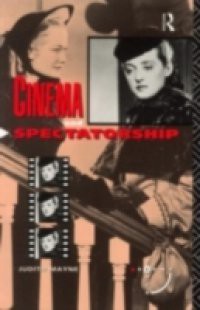Cinema and Spectatorship is the first book to focus entirely on the history and role of the spectator in contemporary film studies. While 1970s film theory insisted on a distinction betweeen the cinematic subject and film-goers, Judith Mayne suggests that a very real friction between "subjects" and "viewers" is in fact central to the study of spectatorship.In the book's first section Mayne examines three theoretical models of spectatorship: the perceptual, the institutional and the historical, while the second section focuses on case studies which crystallize many of the issues already discussed, concentrating on textual analysis, the `disrupting genre', `star-gazing' and finally the audience itself. Case studies incude the place of the spectator in the textual analysis of individual films such as The Picture of Dorian Gray; the construction of Bette Davis' star persona; fantasies of race and film viewing in Field of Dreams and Ghost; and gay and lesbian audiences as "critical" audiences. The book provides a very thorough and accessible overview of this complex, fragmented and often controversial area of film theory.

